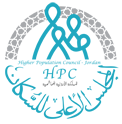

The Higher Population Council’s Board of Trustees members discussed during a meeting held yesterday on Monday headed by the Minister of Planning and International Cooperation / the President of the Higher Population Council’s Board of Trustees Naser Shraideh, with the presence of the Board of Trustees members of ministers and representatives of national stakeholders concerned, the Council’s 2020 achievements as well as its functioning according to its strategic plan and its action plan and 2021 draft budget.
Shraideh affirmed the importance of the role the Higher Population Council in supporting and backing population and development issues to promote demographic reality in society, especially under the economic and social challenges Jordan faces and specifically those imposed by the coronavirus pandemic. He praised the Council’s important and active role during the pandemic, through preparing computerized presentations on the extent of the effects of the pandemic on different population groups and how to address its impact, as well as preparing expected scenarios on the extent of the spread of the virus in Jordan and which were presented to decision-makers to benefit from in planning and developing suitable policies to face the implications of the pandemic on various areas.
He also revealed the solidarity and cooperation of all national stakeholders in servicing population and development issues and uniting its efforts in this area to achieve the desired objectives, as well as the importance of cooperation in carrying out the strategy of the Higher Population Council, concerned organizations adopting recommendation policies and study results prepared by the Council and presenting support and backing to the Council to carry out its projects, programs and future aspirations and which serve society and contribute in achieving the wellbeing and prosperity of Jordanian citizens in all areas.
For her part, the Secretary General of the Higher Population Council Dr. Abla Amawi reviewed, with the members, the Council’s most notable 2020 achievements and which come within three levels (enabling environment, institutional, individual or societal). She revealed that within the enabling environment, a number of studies and strategies and policies briefs were prepared. The most notable of those were the 2020-2030 National Strategy for Reproductive and Sexual Health, 2021-2030 National Population Strategy, studies on “Population and Development Issues in Print and Audio-visual Media in 2019 / Analytical Study”, “Activating the Role of the Private Sector in Jordan in Providing Sexual and Reproductive Health Services”, “Reproductive Health Among Teenage Refugees at Camp – Qualitative Assessment on Needs at a National Level” and “The Effects of the Coronavirus Pandemic on Gender Based Violence Among Syrian Refugee Women and Girls in Jordan”; policy briefs on “Women’s Effective Role in Municipal Councils in Response to crises” and “The Role of Accountability in Sustaining Sexual and Reproductive Health Programs in Crises and Fragile Conditions in Jordan”; and a report on monitoring following-up on the progress of achievement and investment in population opportunities policies in the years 2018-2019, as well as following up on the work of the first session of the Arab Population and Development Council and which works under the Arab League.
As regards to the achievements of the Council on the institutional and individual and societal levels, the most notable were represented by, according to Amawi, carrying out a training program for members of municipal councils on integrating the population dimension and gender in municipal council plans and preparing project proposals as well as building the abilities of partners on how to measure the indicators of the 2020-2030 National Strategy for Reproductive and Sexual Health and the abilities of media professionals in population and development areas. This is as well as carrying out a youth debate on activating the role of women in decision-making and political participation, preparing a training manual for Arab councils on structuring the work of Arab population councils and committees, carrying out short story and film production competitions on the social and economic effects of the coronavirus pandemic on young people and participating in meetings and presenting lectures concerning population and development issues on local, regional and international levels.
Amawi also reviewed with the members the Council’s 2021 plan and which outcomes are based on the elements of (population and development, reproductive and sexual health and rights, responding to the dimensions of forced migration and asylum, empowering women and gender equality). She also revealed that the possible factors in achieving these elements include activating the effectiveness and operational efficiency of the Council in drafting policies and carrying out programs, resource and result management, strengthening partnerships and financial sustainability, as well as the production of knowledge and its classification, publishing and management in programs and studies.
Amawi affirmed the necessity of increasing national efficiency in the definition of inclusive development and how population dynamics relate to that. She also affirmed the necessity of strengthening women economic participation activation policies and social protection policies, as well as the importance of providing comprehensive and complete data and indicators on a subnational level, the importance of optimal investing in population opportunities and establishing budgets that respond to its policies and the importance of inclusivity and justice in providing reproductive health services, focusing on teenagers and disabled young people.







